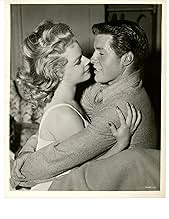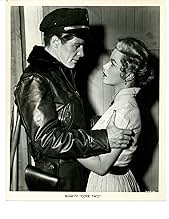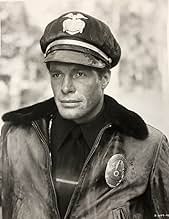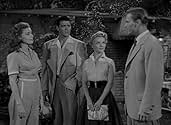NOTE IMDb
6,1/10
555
MA NOTE
Ajouter une intrigue dans votre langueThe adventures of motorcycle cops, from their academy days, to chasing crooked truckers.The adventures of motorcycle cops, from their academy days, to chasing crooked truckers.The adventures of motorcycle cops, from their academy days, to chasing crooked truckers.
- Réalisation
- Scénario
- Casting principal
George Barrows
- Henchman with Rifle
- (non crédité)
Margaret Bert
- Rural Driver's Wife
- (non crédité)
Robert Carson
- Homicide Detective
- (non crédité)
Phil Chambers
- Police First Sergeant
- (non crédité)
John Close
- Police Lieutenant
- (non crédité)
Chuck Connors
- Deputy Sheriff
- (non crédité)
Fred Datig Jr.
- Police Candidate
- (non crédité)
Avis à la une
Have for a while been on a roll tracking down and watching not so well known (near-obscure in some cases) films from filmographies of actors/actresses that varied from very famous to practically forgotten today. In 'Code Two's' case Ralph Meeker and Keenan Wynn were the best-known of the cast. Also have always really liked the genre and liked the concept, so they were further reasons for wanting to see 'Code Two'. If it weren't for me seeing a few of Meeker's films recently, this film's existence would still be unknown to me.
On the whole, 'Code Two' is worth tracking down, even non-motorcycling fans should find some worth (speaking as one but appreciate them), and that it is near-forgotten today is not that deserved. It is not a great film, or an essential, and is a film of two halves in my view, one a good deal stronger than the other. There are though a lot of strong things about it and anybody that loves the genre should see it for at least completest sake.
'Code Two' isn't perfect. Some of the first half is nostalgic and amusing and the atmosphere of the academy is done accurately, but it is also rather exposition-heavy, thin on plot and takes too long to set up. The second half is certainly much better, but it did mean that it was like seeing two films in one and of two different tones, one more nostalgic and light-hearted and the other grittier and more tough.
Meeker does give a confident performance in the lead and it is the sort of role that suits him well, sadly though Chuck is agreed quite obnoxious and not easy to get behind. The very end felt on the cheesy side and jarred by the quite suspenseful build up.
However, 'Code Two' has a very effectively noir-ish look in especially the second half. The semi-docmentary look of the truly startling and quite brutal opening is also incredibly effective and hits hard. The music serves its purpose well and fits at least, not over-emphasising the mood. The direction is assured and a good mix of affectionate and unyielding on the most part, apart from some lapses in momentum in more expositionary moments. The motorcycles are very cool and will be a treat for anybody that has an interest in them.
The script has entertainment value and tautness and while the first half was for me flawed the film did start off brilliantly with an opening that as said hits hard. The second half, also as already said, is the stronger and much more consistent half. It isn't earth shattering originality wise, but more than makes up for it with its tight pace, its grim tension and its non-holding back atmosphere. Meeker, despite his character, carries the film well and is very well supported by Wynn (as a contender for the most interesting character), sympathetic Elaine Stewart and Robert Horton.
All in all, uneven but above average curiosity. 6/10
On the whole, 'Code Two' is worth tracking down, even non-motorcycling fans should find some worth (speaking as one but appreciate them), and that it is near-forgotten today is not that deserved. It is not a great film, or an essential, and is a film of two halves in my view, one a good deal stronger than the other. There are though a lot of strong things about it and anybody that loves the genre should see it for at least completest sake.
'Code Two' isn't perfect. Some of the first half is nostalgic and amusing and the atmosphere of the academy is done accurately, but it is also rather exposition-heavy, thin on plot and takes too long to set up. The second half is certainly much better, but it did mean that it was like seeing two films in one and of two different tones, one more nostalgic and light-hearted and the other grittier and more tough.
Meeker does give a confident performance in the lead and it is the sort of role that suits him well, sadly though Chuck is agreed quite obnoxious and not easy to get behind. The very end felt on the cheesy side and jarred by the quite suspenseful build up.
However, 'Code Two' has a very effectively noir-ish look in especially the second half. The semi-docmentary look of the truly startling and quite brutal opening is also incredibly effective and hits hard. The music serves its purpose well and fits at least, not over-emphasising the mood. The direction is assured and a good mix of affectionate and unyielding on the most part, apart from some lapses in momentum in more expositionary moments. The motorcycles are very cool and will be a treat for anybody that has an interest in them.
The script has entertainment value and tautness and while the first half was for me flawed the film did start off brilliantly with an opening that as said hits hard. The second half, also as already said, is the stronger and much more consistent half. It isn't earth shattering originality wise, but more than makes up for it with its tight pace, its grim tension and its non-holding back atmosphere. Meeker, despite his character, carries the film well and is very well supported by Wynn (as a contender for the most interesting character), sympathetic Elaine Stewart and Robert Horton.
All in all, uneven but above average curiosity. 6/10
Code Two from MGM's B picture unit is the story of three rookie cops at the Police Academy and then their first assignments on motor patrol with the LAPD. This is not a Police Academy film by any means, it could have been done by Jack Webb. At Warner Brothers in the Thirties the rookie with the big mouth and attitude would have been played by Jimmy Cagney.
And the training officer would have been played by Pat O'Brien. Here at MGM in the Fifties the parts are played by Ralph Meeker and Keenan Wynn respectively. The other two rookies are Jeff Richards and Robert Horton.
All three opt for motorcycle patrol and within days of being assigned Richards is killed when he stops a truck doing a little smuggling. After that Meeker loses the attitude and he and Horton take leave just to find Jeff Richards' killers.
Code Two is a combination of a long Dragnet episode and one of those basic training military films. Meeker is kind of a lovable lout who gets real serious as the occasion calls.
There's some good Los Angeles location photography and nicely staged action sequences. All in all an acceptable B programmer.
And the training officer would have been played by Pat O'Brien. Here at MGM in the Fifties the parts are played by Ralph Meeker and Keenan Wynn respectively. The other two rookies are Jeff Richards and Robert Horton.
All three opt for motorcycle patrol and within days of being assigned Richards is killed when he stops a truck doing a little smuggling. After that Meeker loses the attitude and he and Horton take leave just to find Jeff Richards' killers.
Code Two is a combination of a long Dragnet episode and one of those basic training military films. Meeker is kind of a lovable lout who gets real serious as the occasion calls.
There's some good Los Angeles location photography and nicely staged action sequences. All in all an acceptable B programmer.
Motorcycle Cops and Motorcycles are the Main Thing in this Mainstream Movie of the Docu-Types that were Prolific in the Early Fifties. This one has the Whole First Half Devoted to a Behind the Scenes Look at the Police Academy Training. Intriguing to Some it is quite a Boring Affair unless Ogling the Vintage Bikes is Your Thing.
It Zeroes in on Three Recruits and Their Initiation with some Youthful Playfulness and getting the Babes is Forefront. In the Second Half it is a much Better Movie as these Rookies are Thrust into a Crime Investigation and in the Third Act it Becomes a real Barn Burner with some Hard-Edged Violence and Believable Danger.
Ralph Meeker Melts the Screen with His Macho Egomania and Foolish Behavior but in the Space of the Film's Short Running Time Matures into a Full Blown Police Officer, however never Losing Sight of the Ladies.
It Zeroes in on Three Recruits and Their Initiation with some Youthful Playfulness and getting the Babes is Forefront. In the Second Half it is a much Better Movie as these Rookies are Thrust into a Crime Investigation and in the Third Act it Becomes a real Barn Burner with some Hard-Edged Violence and Believable Danger.
Ralph Meeker Melts the Screen with His Macho Egomania and Foolish Behavior but in the Space of the Film's Short Running Time Matures into a Full Blown Police Officer, however never Losing Sight of the Ladies.
"Code Two" is a film that lost money at the box office. Despite that as well as a few clichés in the story, it's a dandy film and worth your time.
The movie follows a trio of men, particularly Chuck O'Flair (Ralph Meeker), from the police academy to their first assignment in Los Angeles. Chuck is a very stereotypical guy--much like the sorts of guys William Haines played in the 1920s and 30s. In other words, he is very skilled but even more full of himself! And, when it comes to women, he thinks they'll all swoon at his boorish ways. However, his obnoxious veneer is challenged when his partner is murdered on the job...and Chuck not only blames himself but insists on tracking down the killers.
This film runs at under 70 minutes and its stars are Meeker and Keenan Wynn...minor stars but typical of the sorts of assignments they'd get from the studio. Look past how obnoxious the writer made Chuck (that is a major problem in the film) and you'll be able to enjoy a decent cop film.
The movie follows a trio of men, particularly Chuck O'Flair (Ralph Meeker), from the police academy to their first assignment in Los Angeles. Chuck is a very stereotypical guy--much like the sorts of guys William Haines played in the 1920s and 30s. In other words, he is very skilled but even more full of himself! And, when it comes to women, he thinks they'll all swoon at his boorish ways. However, his obnoxious veneer is challenged when his partner is murdered on the job...and Chuck not only blames himself but insists on tracking down the killers.
This film runs at under 70 minutes and its stars are Meeker and Keenan Wynn...minor stars but typical of the sorts of assignments they'd get from the studio. Look past how obnoxious the writer made Chuck (that is a major problem in the film) and you'll be able to enjoy a decent cop film.
The first half of this modest 69-minute movie tells, in semi-documentary fashion, of the training of rookie cops in early 1950s Los Angeles. Needless to say, all these rookies are white males but it's the "dated" quality of the movie which lends it a curiosity value as an artifact of its time. Police buffs should enjoy looking over the equipment, the uniforms, the training techniques, the investigation methods, etc.
A let's-catch-the-cop-killers plot takes over in the second half. It's minor stuff but affords an opportunity to look over a cast soon to find greater success in TV westerns. There's Robert ("Wagon Train") Horton and Jeff ("Jefferson Drum") Richards and -- in a small part -- Chuck ("The Rifleman") Connors. Rounding out the cast of cops are Ralph Meeker and Keenan Wynn. There's a certain "fetish" appeal in seeing these men in boots and leather jackets and motorcycle pants, and Meeker, Horton, and Richards also do a "beefcake" scene by a lake where they appear in swimsuits. (Richards must have tipped the wardrobe department to give him the snuggest-fitting suit.)
A few scenes appear to be shot on actual L.A. streets but much of it is recognizable as the MGM back-lot. Somewhere, on one of those hills, Robert Horton would soon be stripped to his shorts and tortured by North Korean guards in "Prisoner of War."
Director Fred Wilcox later helmed the classic "Forbidden Planet."
A let's-catch-the-cop-killers plot takes over in the second half. It's minor stuff but affords an opportunity to look over a cast soon to find greater success in TV westerns. There's Robert ("Wagon Train") Horton and Jeff ("Jefferson Drum") Richards and -- in a small part -- Chuck ("The Rifleman") Connors. Rounding out the cast of cops are Ralph Meeker and Keenan Wynn. There's a certain "fetish" appeal in seeing these men in boots and leather jackets and motorcycle pants, and Meeker, Horton, and Richards also do a "beefcake" scene by a lake where they appear in swimsuits. (Richards must have tipped the wardrobe department to give him the snuggest-fitting suit.)
A few scenes appear to be shot on actual L.A. streets but much of it is recognizable as the MGM back-lot. Somewhere, on one of those hills, Robert Horton would soon be stripped to his shorts and tortured by North Korean guards in "Prisoner of War."
Director Fred Wilcox later helmed the classic "Forbidden Planet."
Le saviez-vous
- AnecdotesThe art on the cover of the Warner Brothers Archive Collection DVD shows Ralph Meeker laying next to Elaine Stewart in a bathing suit. In the movie, it is Jeff Richards who is next to Stewart in this scene, whereas Meeker is in a canoe with his girlfriend. This art may be from an original lobby card for this movie or maybe was created specifically for the DVD box art.
- GaffesWhen O'Flair is fighting the bad guy with a meat cleaver, the bad guy takes a couple of swings at O'Flair and misses, hitting the wall instead. Before that, you can see about a dozen marks in the wall from previous takes.
Meilleurs choix
Connectez-vous pour évaluer et suivre la liste de favoris afin de recevoir des recommandations personnalisées
Détails
Box-office
- Budget
- 472 000 $US (estimé)
- Durée1 heure 9 minutes
- Couleur
- Rapport de forme
- 1.37 : 1
Contribuer à cette page
Suggérer une modification ou ajouter du contenu manquant

Lacune principale
By what name was L'auto sanglante (1953) officially released in India in English?
Répondre



































